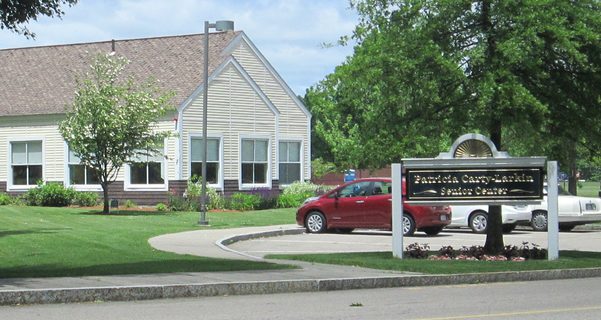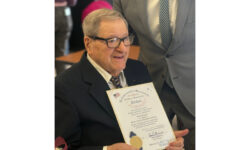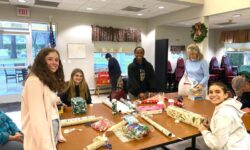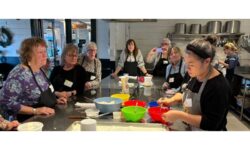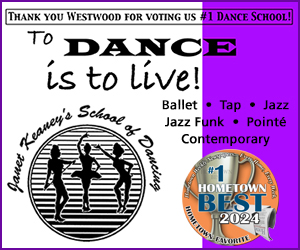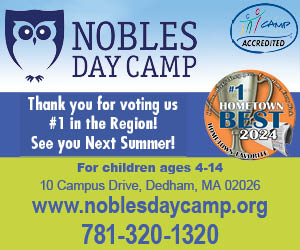By James Kinneen
Hometown Weekly Reporter
There’s no question that, from a physical standpoint, COVID-19 hit the senior population the hardest. Unfortunately, with people being hesitant to visit their grandparents, seniors being hesitant to leave their homes knowing how hard it hits them, and the unfortunate reality of Massachusetts having lost nearly 8,000 mostly older people to the disease, the loneliness and boredom associated with coronavirus has hit seniors the hardest, as well.
But Lina Arena-DeRosa, the director of the Westwood Council on Aging, is trying her best to do something about that. Arena-DeRosa has been doing whatever she can to make sure there are programs on cable television and classes on Zoom to keep seniors entertained and connected during this incredibly trying time.
While she acknowledged that people really miss the large lunches, the bereavement classes, knitting group, and the watercolor art class, she is still positive about how much they’ve been able to do.
On Westwood Media, every weekday from either eight to noon or nine to noon, the cable access channels (channels 8 and 12 on Comcast, 32 and 42 on Verizon Fios) are showing senior center programming like line dancing, yoga, chair yoga, and “Music Matters.” On Zoom the COA is hosting cooking classes, Tai Chi, “Current Conversations” and pilates. For these, people need to send their email addresses to lcavanaugh@townhall.westwood.ma.us - but Lina noted she’d love to get everyone’s email on file, whether they participated on Zoom or not. The advantage of the Zoom classes is that unlike watching a class on TV, people can interact with each other.
“They chat away,” she noted when talking about the cooking classes. “But not during Tai Chi. Tai Chi is very quiet.”
While the programming is meant for seniors, the move to cable means anyone watching TV can see it. So, even though it’s not as good as meeting in person, Arena-DeRosa has been pleased with the response.
“People love it. I have a door full of thank-you notes. I get thank-you calls every day saying 'oh my goodness, I did yoga today, it felt so good I didn’t feel so isolated.' It’s really amazing the response I have gotten from all the cable programming, and you’ve got to give lots of credit to Connor from Westwood Media for that. We’re now on Westwood Media every day from 9-12, so every morning people can get up and either do exercise or yoga or line dancing, maybe listen to a music program. We hope to add some Audubon programming; we’re working on that and some other special programming.”
Audobon programming?
“Yes, birdwatching," she explained. "We figure everybody's home watching the birds out their window anyways, so you might as well understand what you’re looking at.”
While the birdwatching special is something to look forward to, for now, Arena-DeRosa consistently raves about “Music Matters.” The brainchild of Westwood High student Laurel Barnett, “Music Matters” was supposed to be a series of lectures about music from special musical guests, punctuated with a visit to Boston to see an orchestra play Beethoven’s Fifth Symphony.
But when the coronavirus canceled those plans, Barnett refused to let the project end. Instead, she launched a YouTube channel, reached out to local musicians, and made sure the seniors of Westwood still had music to listen to - not simply because music is fun, but because there’s so much evidence of the health effects music has on people. She also knew firsthand how much the music meant to them, having performed at the COA many times with a quartet she formed as a freshman.
“It was supposed to be a series of three lectures, followed by a trip into Boston to see a youth orchestra play Beethoven’s Fifth Symphony," explained Barnett. "I was doing this with a focus on the health benefits of music, particularly with aging, so in addition to the lectures and concert there was, also I made flyers and articles about the health benefits of music and ways to incorporate music into a healthy lifestyle. And then in March, when the senior center closed, we had to cancel the trip into Boston and the April lecture. I was really impressed with the way Lina and the Westwood Media Center have been continuing to provide programming for seniors in Westwood. I really admire how they’re helping people stay connected right now. So, I created a YouTube channel for "Music Matters," because we couldn’t finish the program as planned. I reached out to the person that had been scheduled to lecture in April and he made a video of his lecture. Then he, Lina, Westwood Media Center and I coordinated so that it would be available on the YouTube channel and Westwood Media. Aside from his lecture, I’ve also been posting videos of students from Westwood High, Thurston Middle School and a couple other local high schools playing their instruments or singing a song, so that seniors would have a few minutes of music each day, and get to see a different students face. A couple weeks into this, Westwood Media Center began showing compilations of the videos for an hour a day as part of the COA’s efforts to provide remote programming for seniors who are at home.”
The willingness of other kids to participate in the making of the videos should be applauded as well.
“I was a little bit worried about getting students to participate, but I texted a few friends and everybody was really willing to give their time and make a video for the YouTube channel," Barnett continued. "And, many people also included a brief message for seniors saying 'hello, we’re thinking of you.'”
Lina Arena-DeRosa said that the COA is also looking for donations, but really wanted to emphasize that if, despite all the work she, Laurel Barnett, and the class instructors are doing, seniors are still struggling, they should call the COA - which, while not open to the public, is still open for business.
“We’re here, Monday to Friday, from 8-2. We’re still doing Meals on Wheels out of this building every day for 70 people; we still do outreach services, but it’s all done by phone; and we’re creating programming, but it’s all virtual. We’re open, but we’re not open to the public. I want people to know we’re here. I want people to know we’re available. I want people to know that if they’re feeling isolated to call us, and we’ll try to connect them. I want people to know that even though we’re closed to the public, we’re still available.”




